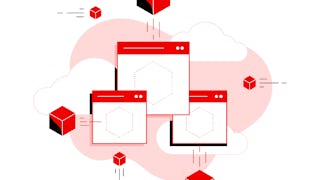Filter by
SubjectRequired
LanguageRequired
The language used throughout the course, in both instruction and assessments.
Learning ProductRequired
LevelRequired
DurationRequired
SkillsRequired
SubtitlesRequired
EducatorRequired
Explore the Ubuntu Linux Course Catalog

Skills you'll gain: Apache Hive, Database Management, SQL, Big Data, Database Systems, Data Management, Amazon S3, Query Languages, Data Storage Technologies, Cloud Storage, Data Import/Export, Performance Tuning, File Management, Command-Line Interface

Johns Hopkins University
Skills you'll gain: Remote Access Systems, Linux, Web Applications, Internet Of Things, Embedded Systems, Application Programming Interface (API), Linux Commands, Command-Line Interface, System Configuration, General Networking, Computer Hardware, Python Programming, Software Installation, Operating Systems, Peripheral Devices

Skills you'll gain: OpenShift, Application Deployment, Kubernetes, Containerization, Docker (Software), Cloud-Native Computing, CI/CD, YAML, Configuration Management, Application Lifecycle Management, Data Storage, Command-Line Interface, Debugging

Skills you'll gain: Linux Administration, Linux, Linux Servers, Authentications, Virtual Machines, Virtualization, Security Controls, User Accounts, Red Hat Enterprise Linux, System Configuration, Identity and Access Management, Virtual Environment, Cybersecurity

Duke University
Skills you'll gain: MLOps (Machine Learning Operations), Application Deployment, Containerization, CI/CD, Docker (Software), Microsoft Azure, Cloud Computing, Applied Machine Learning, GitHub, Application Programming Interface (API)

Skills you'll gain: Linux Administration, Systems Administration, Disaster Recovery, Network Troubleshooting, Unix Commands, User Accounts, System Support, Linux Commands, File Management, Linux, OS Process Management, Hardware Troubleshooting, Shell Script, Performance Tuning, Virtual Machines, Patch Management, Event Monitoring

Dartmouth College
Skills you'll gain: C (Programming Language), Embedded Systems, Computer Engineering, Embedded Software, Engineering Software, System Programming, Computer Programming, Operating Systems, Data Structures, Linux

Skills you'll gain: Operating Systems, C (Programming Language), Virtual Machines, System Programming, Virtualization, Linux

LearnKartS
Skills you'll gain: Docker (Software), Containerization, Application Deployment, Microservices, Cloud-Native Computing, DevOps, Devops Tools, Data Storage Technologies, Development Environment, CI/CD, Linux Administration, YAML, Network Architecture, Application Lifecycle Management, Network Administration, Security Controls, Network Infrastructure, Virtualization, Software Installation, Software Architecture

Dartmouth College
Skills you'll gain: C (Programming Language), System Programming, Hardware Architecture, Computer Architecture, Embedded Software, Operating Systems, Programming Principles, Computer Programming, Program Development, Debugging

University of California, Davis
Skills you'll gain: Secure Coding, Application Security, Verification And Validation, Code Review, Linux, Vulnerability Assessments, Security Engineering, C++ (Programming Language), User Accounts, Data Validation, Debugging, Cryptography, File Systems, Authorization (Computing), C (Programming Language), Encryption, OS Process Management
 Status: New
Status: NewSkills you'll gain: Shell Script, Linux, Linux Administration, Linux Commands, Unix Shell, Systems Administration, Package and Software Management, Unix Commands, Authorization (Computing), Patch Management, Scripting Languages, Security Controls, Scripting, Dynamic Host Configuration Protocol (DHCP), Identity and Access Management, Authentications, Hardening, IT Automation, Network Administration, System Configuration
In summary, here are 10 of our most popular ubuntu linux courses
- Managing Big Data in Clusters and Cloud Storage: Cloudera
- Beginning Custom Projects with Raspberry Pi: Johns Hopkins University
- Fundamentals of Containers, Kubernetes and OpenShift: Red Hat
- Linux PAM Security Administration: Packt
- MLOps Tools: MLflow and Hugging Face: Duke University
- Advanced Linux Troubleshooting and System Recovery: Packt
- C Programming: Pointers and Memory Management - 4: Dartmouth College
- Intro to Operating Systems 2: Memory Management: Codio
- Docker Certified Associate (DCA): LearnKartS
- C Programming: Modular Programming and Memory Management - 3: Dartmouth College










